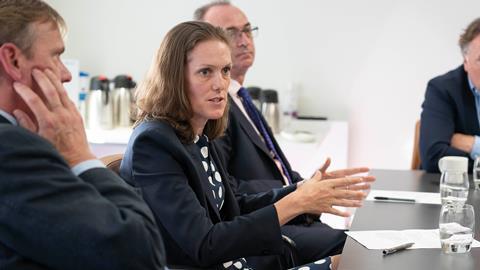Modern conveyancing has ‘specialisms within itself’, reflecting the complexity of a process that is too often assumed to be simple or capable of being ‘standardised’. Eduardo Reyes reports from the latest Gazette roundtable discussion
At the table

Left to right, back row: James Vernor-Miles Hunters Law; Victoria Hodges Teacher Stern; Andrew Weir Anthony Gold; Donall Murphy Russell-Cooke; Amie Mackay Bolt Burdon; Eduardo Reyes Law Society Gazette; Anna Newport Newport Land and Law; Paul Clarke Dye & Durham
Front row: Yasaman Asaad Child & Child; Hema Anand BDB Pitmans; Thom Wilkinson Bishop & Sewell; Sarah Dwight Sarah Dwight Solicitors
‘It’s been a bit of a rollercoaster, hasn’t it?’ BDB Pitmans’ head of private real estate Hema Anand reflects. The past five years, she notes, have included ‘a fairly stagnant market’ with a shortage of stock, ‘because people weren’t happy with the prices they were achieving’. Then came the lockdown restrictions of the Covid pandemic, which temporarily froze property transactions, before the stamp duty ‘holiday’ during which, she says, even clients paying £15m and over were keen to get the benefit of the capped relief available. Property prices shot up. Then, ‘Liz Truss comes along’, sending interest rates up.
When government, the Solicitors Regulation Authority or the competition regulator look at residential conveyancing, the assumption is that practices are in fierce competition for work – sufficient for steps like price transparency to deliver benefits on ‘value’ for consumers. While there is some cut-throat pricing on fees, driven by conveyancing ‘factories’, the reality does not match that picture. Residential conveyancing is rarely a standard ‘product’. Solicitors should in many cases be charging more for their services. That and the ‘rollercoaster’ described by Anand are among the factors that have created recruitment and retention problems for conveyancing practices.
As a result, Anna Newport, principal of Newport Land and Law in Wakefield, says: ‘We have got more instructions than we can shake a stick at, and actually I’ve turned some stuff away recently because you just can’t reasonably service it.’
‘It’s just very busy and has been over the last few years,’ Russell-Cooke’s head of residential property Donall Murphy says. ‘My department has pretty much doubled in size in terms of fee-earners and turnover.’

Specialisation is now widespread in conveyancing departments. Sarah Dwight of Sarah Dwight Solicitors, Birmingham, says she does not act on new build or shared ownership properties. Anand’s firm has separate teams for ‘rural and landed estates’, leaseholder, ‘block management’ and refinancing matters. Amie Mackay, head of the residential team at north London firm Bolt Burdon, specialises in new build properties. Specialisms also vary by geography. Leasehold instructions are far more common in London and the south of England.
Politics influences the property market. The Renters Rights Bill, a manifesto pledge by the Labour government, was published in September. The legislation aims to provide tenants with protections against eviction and places extra responsibilities on landlords to maintain the safety of properties. It will also create an ombudsman for the sector. One result is that some landlords are selling up, putting more housing stock on the market.
London firm Anthony Gold’s head of commercial and residential property Andrew Weir says: ‘As things are made harder and harder for private landlords, they sell up. I can’t count the number of residential landlords that I’ve got who actually come to me to sell their properties.’
'The UK is seen as a ‘safe’ place... the top priority for overseas clients'
Yasaman Asaad, Child & Child
The property market in England and Wales is affected by external shocks because the wider economy feels the impact of war in Ukraine, conflict in the Middle East and the US electorate’s choice of president. But, Weir continues, in England and Wales, ‘we’re stable. Keir Starmer’s definitely going to be around for five years. He seems to have a really intelligent chancellor’.
The UK is also seen as a ‘safe’ place, says Yasaman Asaad, head of the Middle Eastern desk at London firm Child & Child. That is relevant for the overseas buyers she acts for, as is geography, ‘close to the Middle East, everywhere in Europe. [Midway] to America, Canada’. All of which means: ‘The UK is the top priority for overseas clients.’

In the King’s speech, there was a renewed commitment to publish draft legislation on leasehold and commonhold reform, banning the sale of new leasehold flats and enhancing leaseholder ‘enfranchisement’. It might reinvigorate the use of the ‘commonhold’ category.
‘Clients pick up on it and they ask about it,’ Dwight notes. But there is scepticism among those present about imminent change here. ‘I would be staggered if they achieve that before I retire,’ reflects James Vernor-Miles, partner at London firm Hunters.
Murphy recalls previous attempts at reform. ‘They tried it before,’ he says. ‘I remember a colleague of mine became the specialist in commonhold.’ The decision to specialise proved premature on that occasion.
'If you know you’re now in a contract race or you’ve got exclusivity for 14 days, you know what comes with the territory, that you’ve got to be on it and you’re going to have to prioritise the transaction. You’ve charged accordingly'
Hema Anand, BDB Pitmans
Client expectations increase the pressure on residential conveyancing solicitors. ‘We call it the Amazon effect,’ explains Mackay. ‘Everyone gets everything here and now. You’ve forgotten your husband’s birthday present, you can order it to come the same day.’ As a result, she says, clients think: ‘Why can’t I get that from the lawyers? Why can’t I just get the keys tomorrow?’

In this context, client education and managing client expectations from the start are of central importance to the transaction.
Anand says: ‘It does depend on the nature of the transaction. If you know you’re now in a contract race or you’ve got exclusivity for 14 days, you know what comes with the territory, that you’ve got to be on it and you’re going to have to prioritise the transaction. You’ve charged accordingly.’
House rules – key lessons
Don’t judge AI by ChatGPT: The open large language model ChatGPT has been widely tried by lawyers curious about its potential. Of greatest concern are its ‘hallucinations’, which have famously included the invention of case references. As Dye & Durham’s director of product management Paul Clarke points out: ‘There are plenty of solutions out there. When the guard rail is put in place… all of a sudden ChatGPT is providing excellent service.’ Law firms involved in developing AI products limit the sources available to the AI product in completing tasks.
Educate clients: Amie Mackay, head of the residential team at north London firm Bolt Burdon, notes there has been an ‘Amazon effect’ on client behaviour, whereby clients who are used to same-day deliveries bring unreasonable expectations to conveyancing timetables. Educating clients about the process at the outset is helpful. Seeming to pre-empt progress enquiries is also helpful. Mackay recommends ‘push and tell’ – whenever something on a file is chased, the client is informed.
Charge fairly: The presence of ‘bargain’ basement conveyancing outfits and the stress on fees competition by the regulator can lead to conveyancing fees being set too low. Whereas a busy practice, relying on reputation and word-of-mouth recommendations, needs to set realistic fees. Competition for good conveyancers has pushed up the cost of staff retention.
Indemnity policies – worth the paper? When queries become a conveyancing roadblock, use of indemnity policies is common, not least because of time pressure. But are they adequate in the event of an actual claim? Russell-Cooke’s Donall Murphy recalls a prospective claim he had for a client: ‘The insurance company was very defensive.’
Still rewarding: Coverage of conveyancing tends to focus on the pressures. But the rewards – and the sources of satisfaction – are still there for practitioners. ‘I think it’s dealing with a tangible asset you can physically see, you can visit,’ says Teacher Stern’s Victoria Hodges, enthusing about ‘the intellectual challenge of conveyancing… things are constantly changing’. And when acting for repeat clients, or those who arrive by recommendation, there is the prospect of achieving the coveted ‘trusted adviser’ role.

Communication
The first phone call with a client is important, several attendees reflect. ‘In that initial phone call, it’s quite important to get a feel as to why the client is moving house,’ says Victoria Hodges, partner at London firm Teacher Stern. ‘That helps you… Get to know their age, the way they are, so that if you hit that block in the conveyancing road, you can possibly get them over it without them even knowing that there’s been a block there and just guide them through it seamlessly.’
‘From day one, I blind-copy my clients to everything, to all the emails,’ Asaad says. ‘With that, I get fewer people calling me to say, “Oh, what’s happened?” … They already know what’s happening, and as soon as I get emails from the other side, I forward to the client, just saying, “For your information”.’
‘We have a mantra: push-and-tell,’ Mackay notes. ‘Every time you do anything on a file, whether it’s chasing something, getting your paralegal to chase the managing agents, you update your client and let them know, because then they won’t have to chase you. Get in the habit of doing that.’
On some sources of delay, Vernor-Miles says: ‘It’s interesting, when you get to a road-block, [often] your solution is insurance, isn’t it?’ It is too often the default in transactions to use an indemnity policy to get to completion, he argues. ‘It annoys me, the rush to get an indemnity policy when you find a problem. People have forgotten how to fix problems.’ For example, he adds: ‘If you find an important notice on the local search, don’t get an indemnity policy. Get in touch with the council.’
There is an argument for educating estate agents too. Thom Wilkinson, head of property at Bishop & Sewell, describes a scenario where the agent knowing a search result is back means the agent thinks: ‘Now I can chase you to get you to exchange.’ Whereas the results of the search may require following up.
Are ubiquitous insurance policies straightforward to claim against, in the event that a claim is necessary? They often have significant caveats. ‘I nearly had to put in one claim years ago,’ Murphy says. ‘It was to do with windows replaced in a conservation area… and the insurance company was very defensive. It was very much, “Well, we don’t know about this”.’

In the event, he says: ‘We got our planning guys all over it and [it] actually was fine. The local authority backed down [on enforcement]. But for me, it was an interesting exercise… how the insurance company’s first reaction was very much, “Well, we need to think about this one”.’
A leading question, as in other areas of law, is can technology help with conveyancing transactions? ‘I think that digitisation should be embraced where you know that it’s going to make a difference to that particular client,’ Dwight says. ‘If we think about the Land Registry and the use of the portal and perhaps doing network services, we probably all use that service; but 10 years ago, we wouldn’t have. I think it’s taking what we’ve got and using it for the [benefit] of your clients.’
The digitisation programme at Land Registry has often been a source of frustration for conveyancers. ‘It’s really good for straightforward transactions,’ Weir says. But, he adds: ‘I rue the day that the Land Registry went on this effort to digitise the local land charters.’
‘We’ve been talking quite a lot lately about data packs for properties,’ Newport says. ‘You can have a logbook for a car, why don’t we have logbooks for houses that have the up-to-date data… Surely, it’s not beyond the wit of man.’ An ‘electronic deeds pack’, she notes, ‘would actually be useful.’
Vernor-Miles advocates including local searches in property sales packs, reducing delays down the line. ‘[Clients] don’t always follow the advice but it’s a very good idea,’ he notes. ‘There was a good thing about Home Information Packs, which was that it got sellers to do a bit of work before they just did what they tend to do, which is, say, “Oh, I think we’ll sell the property today. Let’s go and see the estate agents, give them the keys”.’
Preparation for a smooth transaction can start with its predecessor transaction where a client is using the same lawyer, Vernor-Miles suggests. ‘The last thing I ever say to a client, just before I close a purchase file is, “I hope you really enjoy your home. Can I remind you that, in five or seven years, when you’re selling or you’re having a conversation about selling, please don’t make the really obvious mistake of making your first phone call to the estate agent? Please make your first phone call to me”.’
First contact with a solicitor, he says, allows for basic information, and his own AML checks, to be done before the property is put on the market.
In a similar vein, Mackay notes: ‘We get a lot of our work from direct referrals from agents, and we educate our agents on exchange-ready service.’
All this relates to what, in an ideal world, conveyancing solicitors would like technology to achieve for the process. Weir relates a description he approves of, heard five years ago, of property lawyers as ‘spiders at the centre of a web reaching out and pulling in information from the Land Registry, the local authority search, from the council, from environmental, searches from the clients themselves’.
Relating that to technology, he suggests: ‘The next big step forward is where we get machine-reading AI programs that will read the Land Registry register, compare that against court cases and say, “In that case, six years ago, there was a court case in which somebody breached that covenant at that time”. Then that goes out to a risk analysis. Same thing on a more simple basis… [on] property information forms, have they missed that tick on that box there? Have they got that FENSA certificate? And all done in three seconds flat. When you get that technology in place, then I think it’s going to completely revolutionise everything.’
For now, however, Newport notes: ‘AI is deranged.’
'From a technology perspective, I find the whole AI piece fascinating, because it’s a buzzword that can cause so much angst'
Paul Clarke, Dye & Durham
But as they happen, do attempts at consistency of process and standards, with which the greater use of technology is closely associated, have an unintended consequence? The argument runs that, unless we are wise to the dangers, tick-box compliance replaces sound legal knowledge and a proper assessment of risks. It is in that context that variations from an apparent ‘norm’ can be harder to resolve and become ‘roadblocks’ in the process.
There is also a knock-on effect for training junior lawyers. If the apparent answer to queries is ‘Oh, computer told me and therefore…’ Anand says, then ‘you’ve got a fractured start to your career, actually… it will have an impact on succession and retention and entry into the profession.’

‘From a technology perspective, I find the whole AI piece fascinating, because it’s a buzzword that can cause so much angst,’ says Paul Clarke, director of product management at Dye & Durham, sponsor of the roundtable. ‘The truth is we all use AI every single day, or we rely on it, and we don’t realise it, because the people providing the service don’t tell you it’s AI‑driven.’
Clarke gives the example of Microsoft Word suggesting a form of words for completing a sentence. ‘It’s AI, but it doesn’t say, “Word, powered by AI”. They don’t throw it in your face.’
He continues: ‘In my view, AI is simply a tool for technology companies to use at an appropriate point in time. There are times you are reference-checking TA forms to see if there is a box ticked. That’s not necessarily AI. That would be a simple algorithm to check [there are] title insurance documents… it’s just the technology provider using the appropriate thing. I would like to see people leveraging technology to make your lives easier. That’s what we want to do at Dye & Durham.’
That is quite different, he notes, from aiming to become an ‘automated conveyancer’, which is not an ambition. But it might help with the work involved in onboarding new clients and ‘with due diligence through to post-completion… we use technology to make enquiries management easier’.
'The amount of time spent doing our risk and compliance for some matters. It just far outweighs the benefit of actually taking the instruction on sometimes. I don’t think there’s any easy answer to that, we all have to do it but it just adds an extra pressure to the profession'
Donall Murphy, Russell-Cooke
That would seem relevant to a point raised earlier in the discussion around the cost of anti-money laundering and know-your-client (KYC) checks.
Hodges notes: ‘Some transactions, you think, actually, it’s almost not worth doing the work, because you know that the KYC side of things and on-boarding is going to be so detailed, and with the source of funds particularly, you have to go to the nth degree… the onus on solicitors now is so heavy.’
Murphy concurs: ‘The amount of time spent doing our risk and compliance for some matters. It just far outweighs the benefit of actually taking the instruction on sometimes. I don’t think there’s any easy answer to that, we all have to do it but it just adds an extra pressure to the profession.’
Nevertheless, Wilkinson concludes by considering the rewards of a career in residential property, as ‘the perfect mix of that transactional success that you can get with something that’s an intellectual challenge, which will grow with you, but also has real-world issues to solve’.
- This roundtable was kindly sponsored by Dye & Durham
Photographs by Noah Da Costa





































No comments yet